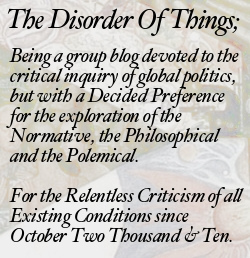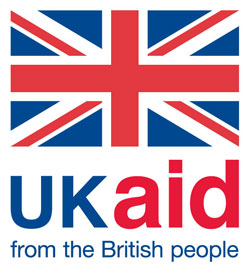(A guest post from Meera Sabaratnam, from the excellent blog The Disorder of Things, who disorder things oh so nicely)
They say that discretion is the better part of valour. But the Deparatment for International Development, or at least its boss, has decided otherwise. It was announced last month that “Aid from Britain will now be badged with a Union Flag when it is sent overseas, as a clear symbol that it comes from the United Kingdom.” In these times of urgently, relentlessly celebrating Britishness in all possible ways, this little ‘tweak’ to development policy may have slipped under the radar.
The ministerial statement in the press release is worth quoting in full, because it is both strange and revealing of a particular – and, I think, regressive – political turn in international development policy:
“For too long, Britain has not received the credit it deserves for the amazing results we achieve in tackling global poverty. Some in the development community have been reluctant to ‘badge’ our aid with the Union Flag.
“I disagree: I believe it is important that aid funded by the British people should be easily and clearly identified as coming from the UK. It is right that people in villages, towns and cities around the world can see by whom aid is provided.
“British aid is achieving results of which everyone in the United Kingdom can be proud. And I am determined that, from now on, Britain will not shy away from celebrating and taking credit for them.”
Let’s look at this in more detail. First, we need to think about the opening claim that “for too long, Britain has not received the credit it deserves for the amazing results we achieve in tackling global poverty”. The obvious question: is this even true? Certainly, under Blair, Britain’s major foreign policy drive was to be seen as an ‘ethical’ power, and most of all in the sphere of global poverty reduction in Africa from 2005 onwards. Since then it has been highly activist in terms of delivering and international development assistance, and in supporting policy change at global institutional levels such as OECD-DAC, and extremely publicly so. The idea that Britain has been generally under-credited in terms of its contribution to global poverty reduction, even if only measured by the platform given by itself to itself, is a pretty strange and somewhat neurotic premise.
But arguably, the Minister here is making the more specific claim about who has been under-appreciative: it is “people in villages, towns and cities around the world”. Such people have not, it is claimed, fullyappreciated the generosity and beneficence of the British people and Her Majesty’s Government in helping those implicity less ‘fortunate’ than themselves. This is an even weirder claim to make: that basically, the global poor are not appreciative or grateful enough of British aid, and need to be fully apprised of its Britishness and its generosity.
It’s puzzling for a whole series of immediately obvious reasons, even without a radical critique of the idea of development aid. First, the national provenance of aid, to anyone who has ever lived or worked in an aid-recipient country, is pretty bleeding obvious. Aid agencies, their buildings, vehicles, insignia and large employment machines, are all highly visible elements of the social and political landscape. Projects and programmes are extensively and excessively marked up with flags and signs, buildings are fiercely guarded and development industry people and volunteers are conspicuous as citizens of particular countries. The difficulty in fact might be to try to visit a hospital or school without a flag or sign on it somewhere marking the generosity of the wealthy.
Second, this move flies in the face of what has been considered morally and technically progressive aid practice over the last three decades: that is, the building of national systems, ‘local ownership’, direct budget support, recognising and working with existing capacities and so forth. DfID has been credited with pushing these ideas and practices up the agenda at an international level and in its own work.
Third, and perhaps more importantly, it is oddly naive in any particular circumstance to try to attribute responsibility for outcomes - as opposed to inputs – to a single national party or programme. The social realities of any ‘development’ intervention are highly complex, and more often than not depend very heavily on the energies, skill, patience and luck of those being targeted rather than the quantity of the donation.
Colonial amnesia and Victorian philanthropy
These are issues which any development industry worker would recognise. Yet, this re-branding exercise also reveals a much more problematic dimension of this government’s approach to international development, which is more broadly to do with colonial amnesia and the simultaneous persistent rehabilitation of the British empire. This of course is taking place in a context where its influence and importance internationally is in decline.
A key element of this is the repeated stipulation and framing of aid as ‘generosity’, for which ‘credit’ can be claimed. ‘Generosity’ implies many things here. The first is that Britain has no actual responsibility, causal, moral, historical or otherwise, towards the world’s poor. As such, aid that is given is an act of generosity rather than a fulfilment of duty or obligation. To fulfil one’s duties or obligations is not to be generous or to deserve credit – this presupposes that one has gone above and beyond obligation.
The ongoing subtext of this is thus the strengthening of the notion that Britain has no historical or contemporary obligations to the world’s poor. Where ‘obligations’ are acknowledged, they are of the kind offered by Victorian philanthropists about alleviating the suffering of anonymous ‘unfortunates’ in the workhouse – these are signs of piety to God through the assistance of His children, or a gesture of simple human kindness or Samaritanism. They imply strongly that the poor of the world have no rightful claim to wealth held by or in Britain.
Most important is the attempt to block a recognition of historical responsibility. Indeed, any attempt to point to the legacies of British colonialism as a directly contributing factor to poverty are cried down passionately, usually followed by an accusation of the speaker’s intended defence of authoritarian regimes. Such an argument is outdated, it is said, given that decolonisation happened for many places over 50 years ago. There is something in this argument insofar as it relates to the status of current and future politics within the global South. Hamid Dabashi‘s recent work on this offers much food for thought and engagement, particularly around questions of political consciousness.
However, it does not apply when looking at the long history of evasion of responsibility that Britain has had with regard to the political economies of its former colonies. Of course, attempts to rehabilitate and appreciate the ‘greatness’ of empire never acknowledge the largely forced global redistributions of wealth and resources that it entailed. Even colonial violence and massacres are more readily acknowledged than the possibility that colonial dispossession might possibly entail claims for reparation of some kind.
Development politics to this extent has consistently been a block on a ‘progressive’ struggle for claims made in the name of ‘justice’ rather than ‘charity’ or simply the ‘catching up’ of less developed peoples. Of course, a treatment of British poverty and wealth along similar lines would be treated as absurdly outdated. Notwithstanding important ideological differences about the details of what social justice entails, there would be *few* who would openly advocate no public entitlement to a basic level of income and housing. And of course, the contemporary backlash against the bankers endorses the idea that they have obligations to the wider public – that they have to pay ‘their fair share’. But is there no claim for a ‘fair share’ for the poor in formerly colonised countries? That no reparations have been paid following decolonisation – indeed that debt payments continue to go in the other direction – should at least support the idea that there may be an ongoing and legitimate distributive claim.
One of the strange elements of this particular turn in UK development policy in the context of rehabilitating and celebrating Britishness is that it also goes against the grain of the current craze for empire, even as it reflects it. Ferguson and the triumphalists want to celebrate British Empire, but at least have to do so by saying that its legacy was positive, not that this legacy didn’t exist. That the Queen and her family have spent the last year visiting all the former colonies and ‘celebrating’ their links also asserts that British colonialism is indeed to be celebrated. Even the “‘leftie, multicultural crap’” must also work with the claim that there is a legacy, although it sees its positive outcomes in different ways i.e. in the effects of migration and political struggle.
But development officials would be laughed out of their meetings if they actually tried to run a line about the positive legacies of colonialism. Thus development policy must be amnesiac and silent about this historical mess of indebtedness, and this latest branding exercise is another confirmation of this. Insisting on the bold display of the flag in this context, whilst refusing any discussion of or reference to imperialism, seems strangely childish. There is a proper argument to be had about what kinds of obligations are owed by former colonising powers to former colonies. But it is one which current development policy repeatedly dodges.


